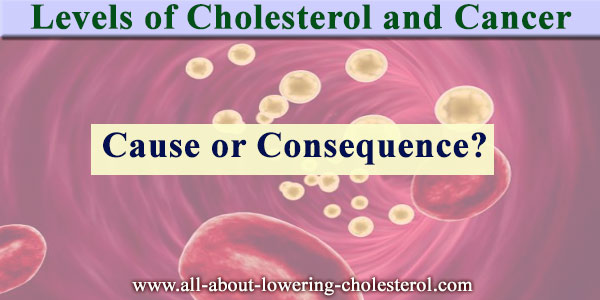
The association between cholesterol and cancer has been a topic of many debates among researchers. For years, researchers believed that your risk of developing cancer went up as your cholesterol level went down.
However, new research shows that having low cholesterol levels may lower your risk of certain cancers including high-grade prostate cancer.
Cholesterol and Cancer – Out-dated Theories
In the past, researchers at the National Cancer Institute falsely drew the conclusion that your risk of developing some cancers was higher if your blood sample revealed low cholesterol levels.
The research studies were large, and at the time, the evidence seemed conclusive. In the study, researchers observed more than 29,000 men for 18 years. At the end of the study, the researchers recorded 7,545 cancer cases and found that low total cholesterol counts were linked with an 18 percent higher risk of developing cancer.
However, the study had a flaw. When researchers excluded cases that occurred in the early years of the study after the original blood draw, the link between low total cholesterol and cancer disappeared.
This new finding suggests that you do not have an increased risk of developing cancer if you have low total cholesterol levels. Instead, a low total cholesterol level was the result of underlying cancer that had not yet been detected.
Cholesterol & Cancer – Cause or Effect?
Based on the above it seems that low cholesterol was an effect of cancer, but not the cause. It’s something like a chicken & egg situation – who came first, the chicken or the egg? Fortunately, in our case, the answer is much simpler. The low cholesterol was a result of cancer, NOT the other way round.
HDL Cholesterol and Cancer – New Research
In 2009, researchers took another look at the cholesterol and cancer connection and found that higher levels of HDL “good” cholesterol were associated with an overall lower risk of developing cancer.
Researchers also found that if you are male and have low cholesterol levels circulating through your blood, you may have a reduced risk of high-grade prostate cancer.
In men with total cholesterol levels below 200 mg/dL (a level considered normal), the risk of developing high-grade prostate cancer was reduced by 59 percent.
The organizations behind these new research studies are quick to note that they mostly conduct more studies with human subjects to draw conclusive evidence of the link between lower cholesterol levels and lower risk of cancer. However, the new evidence is encouraging.
Cholesterol And Cancer – Lifestyle Choices
You will need to wait for more research studies to support the link between lower total cholesterol levels and decreased cancer risks. However, you do not need to wait to make healthy lifestyle changes that can lower your cholesterol and cancer risk factors.
You should follow a diet rich in high-fiber foods as these are foods that lower cholesterol such as whole grains, fresh fruits, and vegetables. These foods have been found to reduce LDL “bad” cholesterol and raise HDL “good” cholesterol levels as well as protected against certain types of cancer.
Your diet should also be low in high cholesterol foods & fats, like saturated fats, which are found in animal sources such as red meats and full-fat milk and dairy products. Saturated fats also can be found in some plant-based oils such as coconut oil, palm oil, and cocoa butters.
Other healthy lifestyle choices you can make to prevent problems with cholesterol and cancer include maintaining a healthy weight, quitting smoking, and performing moderately intense exercise most days of the week for approximately 30 minutes.
You can positively impact your health, lower your total cholesterol level, and reduce your risk of developing cancer by learning to make simple lifestyle changes.
Leave this page about Cholesterol and Cancer and find out more Cholesterol Information
Or check out the homepage for all about Lowering Cholesterol
References:
(1) American Association for Cancer Research (2009). Cholesterol and cancer: answers and some new questions. Retrieved from http://www.aacr.org/home/public–media/aacr-press-releases.aspx?d=1627

